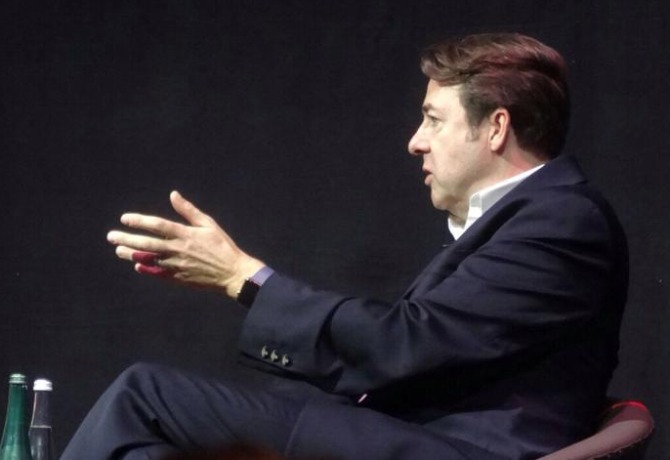British film reviewer and TV personality Jonathan Ross addressed an audience of media professionals at Millennial Media’s Digital Upfront session this morning at London’s Ham Yard Hotel.
“I don’t think the actual way stories are told on screen is changing at all, I don’t think any developments in technology are changing it, nor do I think they will in the future because I think that going to the cinema is very much a communal experience,” said Ross, with regards to how new devices are morphing content.
He added that he thinks video-on-demand is going to change the way studios finance movies and make money, also circumventing piracy.
With regards to piracy, Ross said: “They don’t want to wait a week for the new ‘Walking Dead’, they don’t want to wait for ‘Game of Thrones’, they don’t want to wait for a movie to be released over here which has been shown in America or Japan – why should they?”
However, he didn’t feel that people objected to subscriptions, and cited examples such as Netflix and Amazon as successes in this field.
3D – the future of film?
“3D hasn’t changed storytelling at all; what it has done is help sell tickets for lacklustre movies which people wouldn’t otherwise go and see,” he commented.
“Most of the time you do not benefit at all from 3D and, given the choice, I would rather go and see a 2D version of the film than a 3D, wearing stupid glasses and with slightly washed-out colour on the screen.”
Discussing the investment by cinemas in the 1950s on special projection equipment, and the success of ‘The Creature from the Black Lagoon’, which ran for over a year, he commented: “It has to go hand in hand with investment from the people distributing it”.
“We should always respond to stories in the same way people did two thousand years ago.
“We want to know who the character is, why we care about that character, what obstacles are in that character’s way, we want them to nearly get there, then we want some real shit to come their way so we think everything is over and then we want them to triumph.
“That is essentially the template for most popular storytelling and that hasn’t changed because of 3d and it won’t change if we go into virtual reality,” he said.
On the topic of virtual reality (VR), Ross felt that there will be a barrier as “people don’t really want to sit around looking foolish and as soon as you put a headset on, you look like an idiot and you don’t know what’s going on around you”.
However, he did predict that VR would create a whole mini industry: “You will go places instead of going to play laser tag, you’ll go for a virtual reality day out, and I think it might affect other areas – I know the pornography industry is already very excited about that.”
He went on to discuss a video game which takes footage of the players’ responses at key points throughout the game.
Old Media vs New Media
“We’re on the cusp of old media and new media,” Ross said. “I don’t know how many of the established old media people are fully aware or grasping the potential of new media and I don’t know how many new media people realise that what they have to offer can be used in a different way.”
Discussing new media stars like YouTubers, he said he wouldn’t put them on his show as most are not ready for that level of exposure and aren’t quite able to deliver out of their own area.
“They’re great at speaking to their fans,” he added, going on to praise the authenticity of their content. “Their audience smell the whiff of something being foisted on them a hundred miles away and avoid at all costs.
“In a way, if I were to put them on my show, that would diminish their potential to interact with their audience, because they would suddenly become old media.”
He went on to discuss how old media is migrating to new media platforms, citing examples like Top Gear, “although that was not by choice, necessarily”.
He also praised the value of live events on TV, again harking back to the 50s. “That’s why sport will always be popular – you can’t predict the outcome and it’s live.
“Unless someone does something truly exceptional, it’s the liveness of it, the immediateness, that people connect with.”
What consumers want
Ross felt the shift to mobile wasn’t making huge changes to content. “I think we’re hitting a bit of a roadblock in terms of bandwidth,” he said.
He felt that if the new Bond movie ‘Spectre’ was released in cinemas and mobile devices at the same time, “the system would collapse, it would be all laggy.”
“They’re groaning under the weight of this already,” he added. “At the moment I think it’s going about as fast as it can.”
“Given the choice of watching a film on an iPad or watching a film on a screen at home, they’re going to choose a screen at home.”








